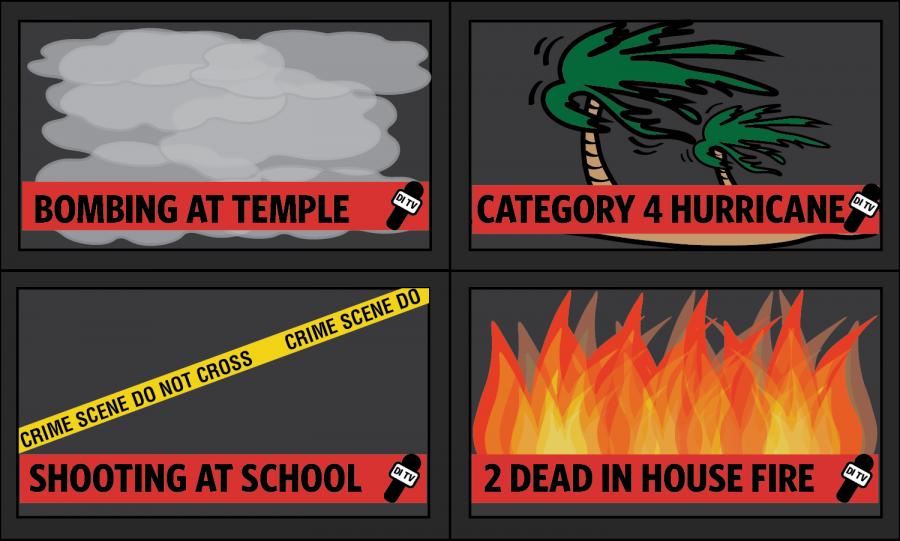To deal with or to disconnect from the news
Mar 6, 2018
My junior year of high school, my dad finally fixed the $20 RadioShack antenna we bought back in 2012 to watch the Olympics, this time in order to pick up PBS. We started watching PBS NewsHour every night at 9 p.m. without fail. The primary elections for the 2016 presidential race were just beginning. Donald Trump’s candidacy was still a running gag, just something to laugh about with a classmate.
Watching the news back then was like keeping up with your favorite soap opera: Each week revealed a new unbelievable twist, another shocking insult or massive scandal that blew up Twitter for a day before the next episode aired and a new wave of drama hit.
While I was in high school, I kept up with the news voraciously. I watched every debate, devoured all of the political analyses and held my breath through the announcement of each new bombing, terrorist attack and school shooting. I was drawn in by every hurricane, every famine, every government that was caught denying its people their basic rights, every shot of starving children with big eyes and hollow bodies.
I watched it all from the comfort of my sofa, every night at 9 p.m. It was addicting; you couldn’t miss a single episode, because tomorrow there would be a new one and watching old news somehow just doesn’t have the same appeal. After all, it’s old news.
I stopped watching when I came to college. At first, it was due to the lack of routine. I wasn’t in the same place every night at 9 p.m. I was doing homework, I was out with my friends. I’d check Twitter in the morning, sure, but that’s not the same.
Get The Daily Illini in your inbox!
One day, while folding my laundry at 8:55 p.m., I pulled out my laptop and turned on the news.
Fires were burning, hurricanes were raging, bombs were being dropped and people were being shot. It didn’t just feel like the world was ending — the world really was ending. I knew it in my bones, and I saw it in the eyes of the man who looked at the camera straight on, dry-eyed, telling strangers how his parents and his sisters had been alive yesterday, standing in front of the rubble that was now being searched desperately for bodies to bury.
I didn’t watch the news for a long time after that.
The world changes too fast. You need to be tuned in for every hour and every minute to really know what’s happening. Nothing is far away — every crisis and injustice feels desperately personal when you’re watching someone affected by it sobbing on camera.
It’s easier to just cut yourself off, to live in a bubble of cute cat videos and homework help on Yahoo Answers, never clicking on a stray article, never absently scrolling through the comments on an innocuous Vine compilation that somehow always manage to turn viciously political — never watching another grieving parent cry on national television ever again.
It feels hopeless. Every effort for change, every step in the right direction seems to be met with pushback from all sides. Things that should be common sense, things like crystal-clear, scientifically proven facts are hotly debated and instantly politicized. Cutting yourself off seems like the safest bet.
It’s not so easy to live disconnected from the world. It’s a choice that you have to make over and over again, every time you pick up your phone, open your laptop or step outside. Sometimes staying ignorant is a necessity to keep yourself sane, to be able to sleep at night and bring yourself to get out of bed in the morning. Sometimes, the not knowing is a pool of dread stuck in your chest, and it’s easier to live knowing the score, the exact delineations of the worst our world has to offer.
The important thing is that it’s a choice, even when it doesn’t feel like it. Whether you make the choice to keep up with the news, through the good and the never ending stream of bad, or the choice to stay blissfully unaware, it’s a choice that deeply affects how you view the world. You have the responsibility of making it.
Sandhya is a freshman in LAS.






